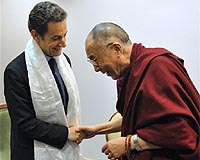| . |  |
. |
Washington (UPI) May 20, 2009 Russian and NATO leaders have very different conceptions on the future nature of modern war --and the Russian ideas seem to be grounded in a lot more realism. Russia is moving energetically to modernize its army with the latest T-90S Main Battle Tanks, Black Shark tactical support attack helicopters, BMP-90 armored personnel carriers, Multiple Launch Rocket Vehicles and many other systems. Also, Russia's military leaders have been warning over the past two years that future full-scale wars, even including the use of nuclear weapons, are certainly not regarded as inconceivable by their planners. Indeed, speaking on May 9, the 61st Victory Day anniversary of the Soviet Union's triumph over Nazi Germany in World War II, Russian President Dmitry Medvedev expressly stated that Russia needs to increase its conventional and nuclear weapons systems to survive in what the Kremlin still regards as an aggressive and dangerous world. The following week Nikolai Patrushev, the aggressive, hard-line head of the Russian Security Council, added his warning that Russian leaders still regard the North Atlantic Treaty Organization and its military forces as a potential threat to them in Europe. By contrast, the Conventional Wisdom in the West, especially in the United States, in the 20 years since the end of the Cold War has been that the Russian armed forces have been no threat and never will be again to the nations of Western Europe. This view, supported by the Soviet and then the Russian army's extremely poor showing in Afghanistan from 1979 to 1987 and then in the two Chechen wars of 1994-96 and 2001-2004, holds that Russia can be eliminated as a serious factor in land power on the Eurasian land mass. These assumptions were complacently held by the military planners of the second Bush administration. And ironically, they are now shared by President Barack Obama and his advisers. President George W. Bush and his main Defense Secretary Donald Rumsfeld allowed U.S. forces in Europe to be dramatically reduced, while committing the U.S. Army and Marine Corps to an exhausting commitment over the past six years in Iraq. Obama hopes to reduce the U.S. commitment in Iraq but not eliminate it until the end of 2011, and he is energetically increasing U.S. ground forces commitments in Afghanistan. For all their differences, Bush and Obama both found the need for significant numbers of U.S. troops to remain in Europe under the NATO umbrella to be inconceivable. As a result, the number of U.S. troops in Europe, 300,000 at the end of the Cold War, is down to less than 50,000 troops now and still shrinking. The major European nations, however, have seen no need to increase the numbers of troops to either enforce security and border controls in their own nations, or to strengthen the security of the new, still weak nation-states that have joined the Alliance in the Balkans and in Central and Eastern Europe. However, the 10 former communist nations of Lithuania, Estonia, Latvia, Poland, the Czech Republic, Slovakia, Hungary, Romania, Bulgaria and Albania that have joined NATO are all consumers of U.S. and Western European security. None of them with the sensible exception of Poland has a sufficiently large and reliable army to actually contribute to NATO security outside their own borders. Part 8: The myths shared by conservatives and liberals about NATO and future wars
Share This Article With Planet Earth
Related Links Learn about the Superpowers of the 21st Century at SpaceWar.com Learn about nuclear weapons doctrine and defense at SpaceWar.com
 Tensions over Dalai Lama casts a shadow over EU-China summit
Tensions over Dalai Lama casts a shadow over EU-China summitPrague (AFP) May 20, 2009 EU and Chinese leaders are to focus on tackling the economic crisis at a summit on Wednesday, but lingering tensions over the Dalai Lama will cast a long shadow over the meeting in Prague. The summit was originally set for last December but China called it off in protest at a meeting between Tibetan spiritual leader the Dalai Lama and French President Nicolas Sarkozy in Poland. France ... read more |
|
| The content herein, unless otherwise known to be public domain, are Copyright 1995-2009 - SpaceDaily. AFP and UPI Wire Stories are copyright Agence France-Presse and United Press International. ESA Portal Reports are copyright European Space Agency. All NASA sourced material is public domain. Additional copyrights may apply in whole or part to other bona fide parties. Advertising does not imply endorsement,agreement or approval of any opinions, statements or information provided by SpaceDaily on any Web page published or hosted by SpaceDaily. Privacy Statement |